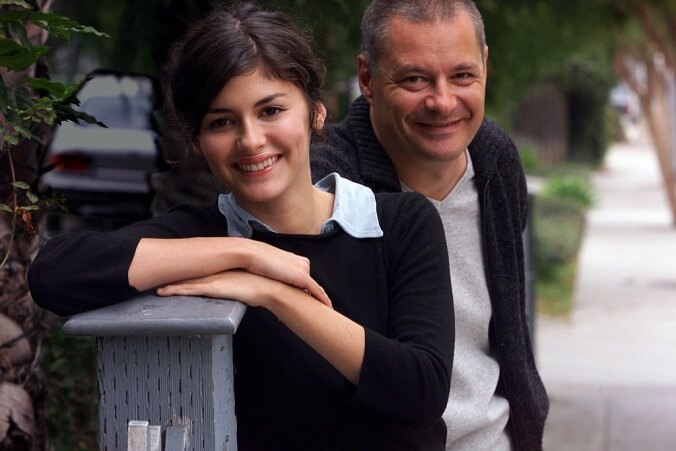Amélie (not Emily) in Paris
Quirky rom-com Amélie felt like a breath of fresh air when it was released two decades ago. It's just as relevant today, but for different reasons

Widely considered one of the most quintessential romantic comedies of all time, Amélie feels as if it has always been around. In truth, though, Jean-Pierre Jeunet’s quirky French confection is relatively fresh in comparison to so many other classic rom-coms. Originally released in the U.S. in February 2002, Amélie is getting a welcome re-release in theaters today.
The film stars Audrey Tautou as a young charmer with a winning smile and a knack for fixing the lives of those around her. Watching it now—in the current moment of celebration for Barbie, Taylor Swift, and Beyoncé—Amélie represents a quieter type of feminine strength. It seems like both an innocent throwback and a reflection of modern womanhood.
Amélie retains its youthful energy and timeless appeal, in large part because of Tautou’s performance as a young woman with social anxiety, who develops schemes and tricks that will help people while allowing her to maintain anonymity. Her small acts of kindness have a big impact on those around her.
The story takes place in 1997, just after the death of Princess Diana, or “Laydee Dee” as the characters call her. In contrast, the film carries an early 20th-century design sensibility, giving the proceedings a cozy, nostalgic feel. Meticulous sets and stylish cinematography evoke the whimsy and distinctive curation of Wes Anderson’s films. Originally, the velocity of the story and rapid cutting were considered “frenetic.” Not anymore. Our sped-up world has caught up to Amélie’s pace and tempo.
As the only child of a father with a “hard heart” and an “unfit” mother, Amélie makes paper dolls and plays solo games like dominoes. She matures into a loner and an observer of life, neglecting her own happiness by obsessing over the unfulfilled lives of others. At 23, working as a café waitress, she stumbles upon a boy’s tin box of small toys and other treasures. She ventures out to find the now grown-up man who lost it, bringing him unexpected joy. Amélie then vows to continue the good deeds that will balance the scales of unfairness around her, setting in motion her purpose in life, to carry out selfless acts of love.
In her community of neighbors, storekeepers, and café regulars, Amélie has her work cut out for her. She brings together two lonely hearts, takes revenge on a bully grocer by doctoring his slippers, his alcohol, and his speed dial, and escorts a blind man through the streets while describing the sights and smells along the way.
Her ventures are well-choreographed, and jaded critics claimed they were too phony and contrived to be fully satisfying. It’s true that Jeunet’s tale, co-written with Guillaume Laurant, is quite removed from real life. This is a filtered version of the city, on the lines of Emily In Paris. The Montmartre section of Paris, with Sacré Coeur looming, is a cliché romantic setting for Amélie to fall for Nino (Mathieu Kassovitz, La Haine), a handsome collector of photo booth strips.
In contrast to the protagonist’s goodness are characters who are flawed—cruel, weird, or annoying—in this adult fairytale that also features nudity, over-the-top orgasms, and dildos. In fact, Nino works at a porn video store (as well as a haunted house at a fairground). Subtle eroticism pervades throughout, as Amélie slides her hand down a bag of lentils or hears the clicking sound of a beaded curtain swaying.
A fragile-as-glass reclusive neighbor, who paints and repaints a copy of Renoir’s “Luncheon Of The Boating Party,” encourages Amélie to pursue her crush, turning the tables by giving her a boost. He admonishes her for caring for others ahead of herself. She decides to lure Nino through a sophisticated scavenger hunt, a maneuver that may be one of the most romantic gestures in rom-com history.
In a society still reeling from the September 11 attacks, Amélie was an escape during its original release by Harvey Weinstein’s Miramax. The film was nominated for five Academy Awards, including Best Screenplay and Best Foreign Film, but failed to take home any statuettes. According to Jeunet, the Academy held a grudge against Weinstein at that point because of his perceived shady campaigning practices.
Whatever the reason for Amélie’s Oscars losses, it didn’t affect the film’s legacy. Like its very specific sense of time and place—it’s not quite a period piece, but it’s not distinctly contemporary, either—Amélie remains an idealized version of a world that’s never existed, but one we all wish we lived in. The film seems both timeless and retro, able to speak to audiences no matter when they watch it.
Back when it was first released, Amélie felt like a refreshing escape, a reminder that there was still some good left in the world. Now, it’s easy to project feelings of loneliness and isolation lingering from the COVID-19 pandemic onto Amélie’s shyness and quirky behavior. Twenty years from now, there will be a new modern anxiety, and Amélie will probably prove to be a surprisingly prescient backdrop for that, too. It might be a little contrived, but Amélie’s escapist charm is undeniable.